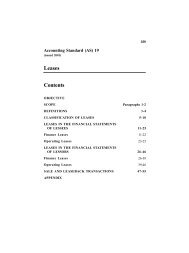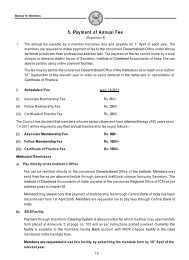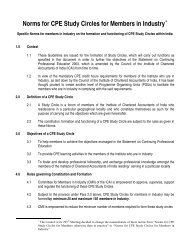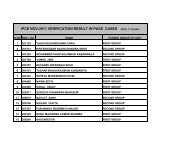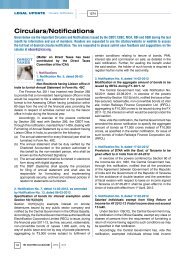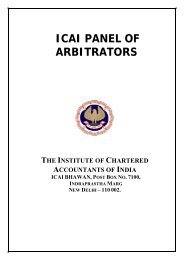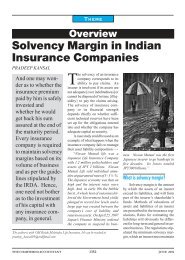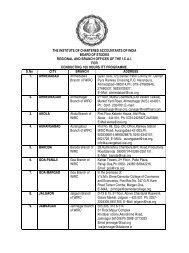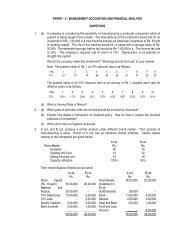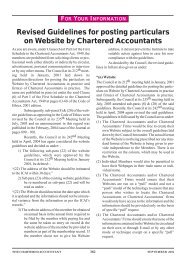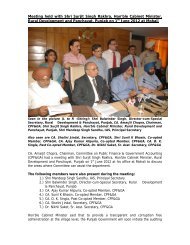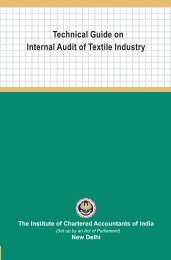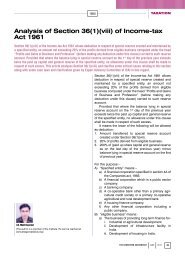The Chartered Accountant
The Chartered Accountant
The Chartered Accountant
Create successful ePaper yourself
Turn your PDF publications into a flip-book with our unique Google optimized e-Paper software.
TAXATION<br />
or from any business connection in India shall<br />
be deemed to accrue or arise in India. <strong>The</strong> appellant<br />
is a non-resident assessee.<br />
l Section 9 raises a legal fiction, but as regards<br />
the contextual interpretation the legal fiction<br />
must be construed having regard to the object<br />
it seeks to achieve. <strong>The</strong> legal fiction created<br />
under section 9 must also be read having regard<br />
to the other provisions thereof.<br />
l <strong>The</strong> provisions of section 42 of the Incometax<br />
Act, 1922 provide that only such part of<br />
income as is attributable to the operations carried<br />
out in India would be taxable in India.<br />
l Territorial nexus doctrine, thus, plays an important<br />
part in assessment of tax. Tax is levied<br />
on one transaction where the operations<br />
which may give rise to income may take place<br />
partly in one territory and partly in another.<br />
<strong>The</strong> question which would fall for consideration<br />
is as to whether the income that arises<br />
out of the said transaction would be required<br />
to be proportioned to each of the territories<br />
or not.<br />
l Income arising out of operation in more than<br />
one jurisdiction would have territorial nexus<br />
with each of the jurisdictions on actual basis.<br />
If that be so, it may not be correct to contend<br />
that the entire income ‘accrues or arises’<br />
in each of the jurisdictions. <strong>The</strong> Authority has<br />
proceeded on the basis that supplies in question<br />
had taken place offshore. It, however, has<br />
rendered its opinion on the premise that offshore<br />
supplies or offshore services were intimately<br />
connected with the turnkey project.<br />
l In the instant case, it is only for the purpose<br />
of taxability that the terms of the contract are<br />
required to be construed. A turnkey contract<br />
may involve supply of materials used in the<br />
execution of the contract for price as also for<br />
use of the materials by works and Labour; but<br />
the same may not have any relation with the<br />
taxability part of it.<br />
l Tax under the Act has to be assessed under<br />
different heads. Income under one head may<br />
be subjected to exemption and deductions<br />
may be claimed under same head while under<br />
another head no tax may be payable at all.<br />
Whether a part of the income of the assessee<br />
would be taxable or not depends upon the fact<br />
of each case. Even there is nothing to prevent<br />
the income accruing or arising at the sources.<br />
l <strong>The</strong> principle of apportionment is also recognized<br />
by clause (a) of Explanation 1 to section<br />
9(1)(i). Thus, if submission of the revenue is<br />
accepted that the contract is a composite one,<br />
then offshore supply would be of equipment<br />
designed and manufactured in one territory<br />
(Japan), and then sold in another tax territory,<br />
leading to division of profits arising in two tax<br />
territories, which is not envisaged under Indian<br />
taxation law.<br />
l It would give rise to the question as to what<br />
would be the meaning of the phrase ‘business<br />
connection in India’. Mere existence of business<br />
connection may not result in income, to<br />
the non-resident assessee from transaction<br />
with such a business connection, accruing or<br />
arising in India.<br />
l In construing a contract, the terms and conditions<br />
thereof are to be read as a whole. A<br />
contract must be construed keeping in view<br />
the intention of the parties. No doubt, the<br />
applicability of the tax laws would depend<br />
upon the nature of the contract, but the same<br />
should not be construed keeping in view the<br />
taxing provisions.<br />
l <strong>The</strong> term ‘permanent establishment’ has not<br />
been defined in the Act. Since the appellant<br />
carries on business in India through a permanent<br />
establishment, it clearly falls out of the<br />
applicability of article 12(5) of the DTAA but<br />
within the ambit of article 7 of DTAA. <strong>The</strong><br />
Protocol of the DTAA discusses about the involvement<br />
of the permanent establishment in<br />
transactions, in order to determine the extent<br />
of income that can be taxed. It is stated that<br />
the term ‘directly or indirectly attributable’<br />
indicates the income that shall be regarded<br />
on the basis of the extent appropriate to the<br />
part played by the permanent establishment in<br />
those transactions. <strong>The</strong> permanent establishment<br />
in the instant case has no role to play<br />
in the transaction that is sought to be taxed,<br />
since the transaction took place abroad.<br />
l Clause 1 of article 7, thus, provides that if an<br />
income arises in Japan (Contracting State), it<br />
shall be taxable in that country unless the enterprise<br />
carries on business in the other Contracting<br />
State (India) through a permanent<br />
THE CHARTERED ACCOUNTANT 991 DECEMBER 2008



